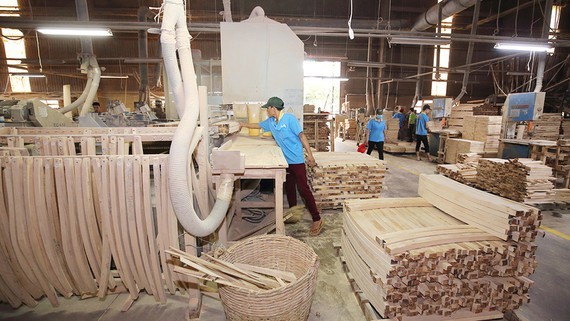
Advancement of CNC precision technology plus new technologies such as artificial intelligence, big data, cloud computing, and robots have helped woodworking technologies to make progresses.
Moreover, these technologies give businesses opportunities to improve quality and reduce dependence on labor as well as sustainable growth.
Vietnam is approaching to be a major furniture supplier in the world in this time when many US importers are shifting China orders to many countries including the Southeast Asian.
However, the wood processing industry has faced challenges when more foreign investment capital has poured in the country.
From the early this year, forestry industry showed a strong increase in export value from the beginning of the year. Overseas shipment of forestry product exports in first nine month reached US$7.9 billion, a year-on-year growth of 18.1 percent, accounting for 26.4 percent of total agro-forestry and seafood export.
Export turnover of the whole year is estimated to reach $11 billion increasing $1.7 billion compared to last year. With average growth of 13 percent from 2010, the industry has stable development with export value of $6.06 billion by September.
Vietnam has risen to exceed Malaysia to be one of major exports in the Asian region just behind China thanks to skilled workers and low production cost.
There have been increase in number of experienced FDI enterprises and a fast and large shift of foreign investors coming to the country, said Director of Vi Dai Company Cao Duy Tam. Experienced FDI enterprises with technologies and strong finance have helped Vietnamese wooden processing sector to be stronger; nevertheless, competition between FDI enterprises and local ones has become fierce resulting in a shortage of laborers.
HAWA Chairman Khanh said that waves of FDI enterprises coming to Vietnam resulted in shortage of laborers in the sector whereas training can’t keep up with demand.
Desperate shortage of laborers plus increased demand have caused a pause in production. In 2018, it took 75 days to complete an order but it is 90 days or even 120 days now.
Worse, Vietnam's labor productivity is among the lowest in Asia. According to the Ministry of Labor, Invalids and Social Affairs, Vietnam's labor productivity last year was US$11, 142 equivalent to 7.3 percent of Singapore’s, 19 percent of Malaysia’s, 37 percent of Thailand’s, 44.8 percent of Indonesia’s and 55.9 percent of the Philippines’
Another challenge is digitalization which has been changing processing industry, business management, and design. Online business also makes changes in designing industry and production methodologies.
Local wood processing firms are facing many matters simultaneously including solving its internal problems to finish orders and improve added value to keep new customers.
























